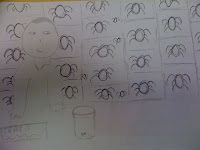Framing of Interviews:
These are the single frames of each of the interviews we are going to conduct, which clearly shows the intended framing and the mise-en-scene of each interviewee:
Questions for Interviews:
Vox Pops:
1. Tell us, what you are most afraid of?
2. How do you react when faced with your fear?
Psychology Teacher:
1. What is fear?
2. What is an irrational fear?
3. Why do we have fears?
4. Are we born with any fears, if so what are they?
5. Why do you think so many people are afraid of the dark as children?
6. Why do you think so many people are afraid of spiders?
7. Why don't people always seek help for their fears?
Hypnotherapist:
1. How long have you been a hypnotherapist?
2. Tell us the story of how you got into it.
3. So what is hypnotherapy?
4. Tell us about the process involved when getting over a fear.
5. How does hypnotherapy help someone get over their fear?
6. Tell us about the most common fear you treat.
7. Tell us about the worst case you have been involved with.
People afraid of spiders:
1. How do you react when you see a spider?
2. Why do you find spiders scary?
3. Tell us about your fear of spiders, why and how it developed?
4. Tell us what happened the last time you saw a spider?
5. Since when have you been afraid of spiders?
6. Would you consider facing your fear?
Aislynn (fear of tall buildings):
1. How do you react when you see a tall building?
2. Why do you find tall buildings scary?
3. Tell us about your fear of tall buildings, why and how it developed?
4. Tell us what happened the last time you saw a tall building?
5. Since when have you been afraid of tall buildings?
6. Would you consider facing your fear?






